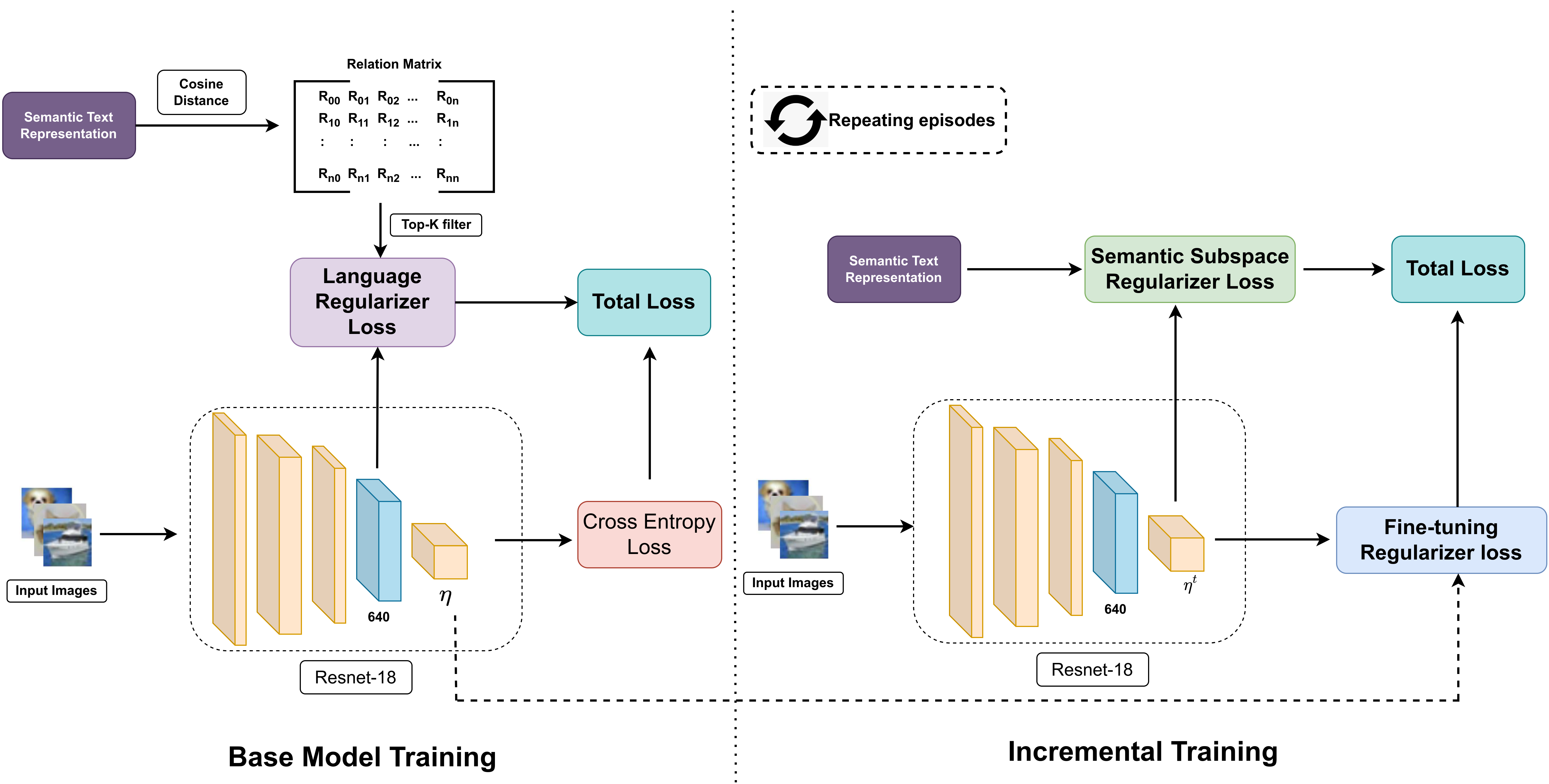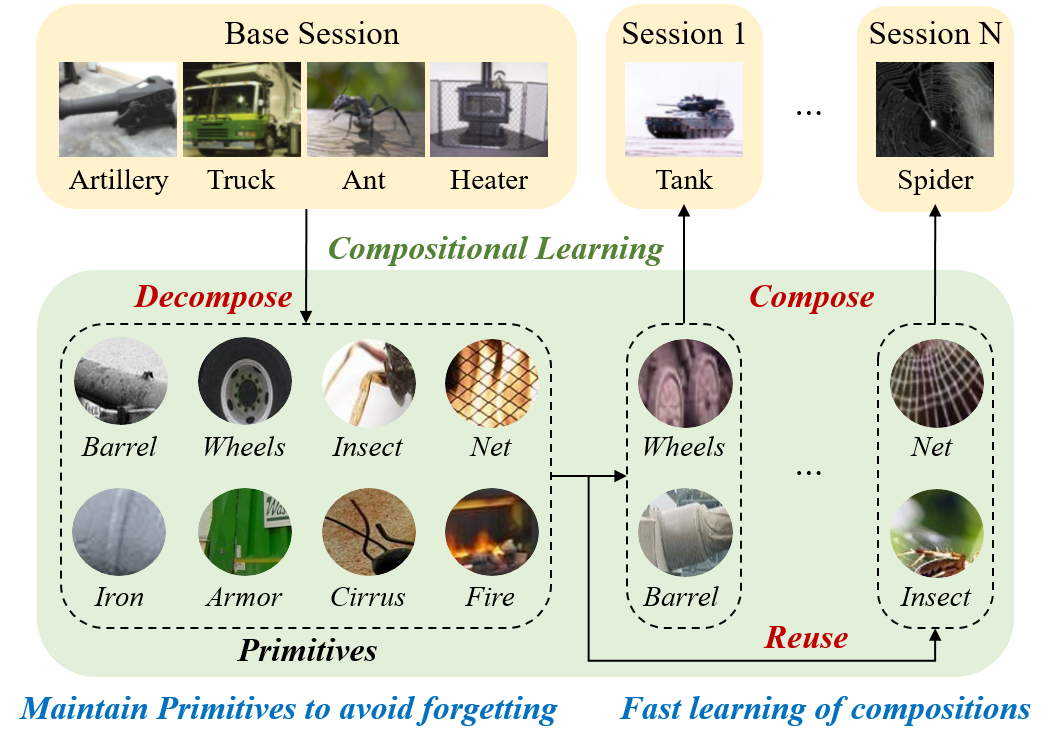Knowledge Adaptation Network for Few-Shot Class-Incremental Learning

0

Sign in to get full access
Overview
- The paper proposes a Knowledge Adaptation Network (KAN) for few-shot class-incremental learning, which aims to learn new classes with limited data while retaining knowledge from previously learned classes.
- KAN leverages a knowledge adaptation module to adapt the learned knowledge from old classes to the new classes, enabling efficient learning of new classes.
- The model is evaluated on several benchmark datasets and demonstrates improved performance compared to existing few-shot class-incremental learning methods.
Plain English Explanation
The paper presents a new approach called the Knowledge Adaptation Network (KAN) for a problem called few-shot class-incremental learning. This problem involves learning new classes of data with only a small amount of examples, while also trying to retain the knowledge the model has learned about previous classes.
The key idea behind KAN is to use a knowledge adaptation module that can take the knowledge the model has learned about old classes and adapt it to help learn the new classes more efficiently. This allows the model to learn new classes quickly, while also maintaining its performance on the old classes.
The researchers evaluated KAN on several standard datasets used for this problem, and found that it outperformed existing methods. This suggests that the knowledge adaptation approach is a promising way to tackle the challenge of learning new things while preserving past knowledge.
Technical Explanation
The paper introduces the Knowledge Adaptation Network (KAN) for few-shot class-incremental learning. In this setting, a model is trained on a sequence of tasks, where each task involves learning a new set of classes with only a few examples per class. The key challenge is to learn the new classes efficiently while also retaining knowledge about previously learned classes.
To address this challenge, KAN incorporates a knowledge adaptation module that adapts the model's learned knowledge from old classes to help learn the new classes. Specifically, the knowledge adaptation module takes the features and weights learned for the old classes and generates new features and weights that can be used to initialize the model for the new classes. This allows the model to quickly adapt to the new classes while also preserving its performance on the old classes.
The researchers evaluated KAN on several benchmark datasets for few-shot class-incremental learning, including miniImageNet, tieredImageNet, and CUB. The results showed that KAN outperformed existing state-of-the-art methods on these datasets, demonstrating the effectiveness of the knowledge adaptation approach for this problem.
Critical Analysis
The paper presents a thoughtful approach to the challenging problem of few-shot class-incremental learning. The knowledge adaptation module is a clever idea that allows the model to leverage its past learning to facilitate the acquisition of new knowledge.
One potential limitation of the work is that the evaluation is primarily focused on image classification tasks. It would be interesting to see how well KAN generalizes to other domains, such as natural language processing or reinforcement learning, where the few-shot class-incremental learning problem may manifest differently.
Additionally, the paper does not delve deeply into the intricacies of how the knowledge adaptation module works or the specific design choices that were made. A more detailed technical analysis of this module and its inner workings could provide further insights into its strengths and potential weaknesses.
Overall, the Knowledge Adaptation Network is a valuable contribution to the field of few-shot class-incremental learning, and the authors have demonstrated its effectiveness on several benchmark datasets. Continued research in this area, exploring the broader applicability of the approach and refining the technical details, could lead to even more robust and versatile solutions for this important problem.
Conclusion
The Knowledge Adaptation Network (KAN) presented in this paper offers a promising approach to the challenging problem of few-shot class-incremental learning. By incorporating a knowledge adaptation module that can leverage the model's past learning to facilitate the acquisition of new knowledge, KAN demonstrates improved performance compared to existing methods.
This work highlights the potential of adaptive learning techniques to address the inherent tension between learning new skills and retaining previous knowledge. As AI systems are increasingly deployed in real-world scenarios, the ability to learn efficiently and maintain relevant expertise will be crucial. The insights and techniques developed in this paper could contribute to the advancement of more versatile and adaptive AI systems that can thrive in dynamic, evolving environments.
This summary was produced with help from an AI and may contain inaccuracies - check out the links to read the original source documents!
Related Papers


0
New!Knowledge Adaptation Network for Few-Shot Class-Incremental Learning
Ye Wang, Yaxiong Wang, Guoshuai Zhao, Xueming Qian
Few-shot class-incremental learning (FSCIL) aims to incrementally recognize new classes using a few samples while maintaining the performance on previously learned classes. One of the effective methods to solve this challenge is to construct prototypical evolution classifiers. Despite the advancement achieved by most existing methods, the classifier weights are simply initialized using mean features. Because representations for new classes are weak and biased, we argue such a strategy is suboptimal. In this paper, we tackle this issue from two aspects. Firstly, thanks to the development of foundation models, we employ a foundation model, the CLIP, as the network pedestal to provide a general representation for each class. Secondly, to generate a more reliable and comprehensive instance representation, we propose a Knowledge Adapter (KA) module that summarizes the data-specific knowledge from training data and fuses it into the general representation. Additionally, to tune the knowledge learned from the base classes to the upcoming classes, we propose a mechanism of Incremental Pseudo Episode Learning (IPEL) by simulating the actual FSCIL. Taken together, our proposed method, dubbed as Knowledge Adaptation Network (KANet), achieves competitive performance on a wide range of datasets, including CIFAR100, CUB200, and ImageNet-R.
Read more9/19/2024


0
Few Shot Class Incremental Learning using Vision-Language models
Anurag Kumar, Chinmay Bharti, Saikat Dutta, Srikrishna Karanam, Biplab Banerjee
Recent advancements in deep learning have demonstrated remarkable performance comparable to human capabilities across various supervised computer vision tasks. However, the prevalent assumption of having an extensive pool of training data encompassing all classes prior to model training often diverges from real-world scenarios, where limited data availability for novel classes is the norm. The challenge emerges in seamlessly integrating new classes with few samples into the training data, demanding the model to adeptly accommodate these additions without compromising its performance on base classes. To address this exigency, the research community has introduced several solutions under the realm of few-shot class incremental learning (FSCIL). In this study, we introduce an innovative FSCIL framework that utilizes language regularizer and subspace regularizer. During base training, the language regularizer helps incorporate semantic information extracted from a Vision-Language model. The subspace regularizer helps in facilitating the model's acquisition of nuanced connections between image and text semantics inherent to base classes during incremental training. Our proposed framework not only empowers the model to embrace novel classes with limited data, but also ensures the preservation of performance on base classes. To substantiate the efficacy of our approach, we conduct comprehensive experiments on three distinct FSCIL benchmarks, where our framework attains state-of-the-art performance.
Read more8/16/2024


0
Compositional Few-Shot Class-Incremental Learning
Yixiong Zou, Shanghang Zhang, Haichen Zhou, Yuhua Li, Ruixuan Li
Few-shot class-incremental learning (FSCIL) is proposed to continually learn from novel classes with only a few samples after the (pre-)training on base classes with sufficient data. However, this remains a challenge. In contrast, humans can easily recognize novel classes with a few samples. Cognitive science demonstrates that an important component of such human capability is compositional learning. This involves identifying visual primitives from learned knowledge and then composing new concepts using these transferred primitives, making incremental learning both effective and interpretable. To imitate human compositional learning, we propose a cognitive-inspired method for the FSCIL task. We define and build a compositional model based on set similarities, and then equip it with a primitive composition module and a primitive reuse module. In the primitive composition module, we propose to utilize the Centered Kernel Alignment (CKA) similarity to approximate the similarity between primitive sets, allowing the training and evaluation based on primitive compositions. In the primitive reuse module, we enhance primitive reusability by classifying inputs based on primitives replaced with the closest primitives from other classes. Experiments on three datasets validate our method, showing it outperforms current state-of-the-art methods with improved interpretability. Our code is available at https://github.com/Zoilsen/Comp-FSCIL.
Read more5/28/2024
❗

0
Few-Shot Class Incremental Learning with Attention-Aware Self-Adaptive Prompt
Chenxi Liu, Zhenyi Wang, Tianyi Xiong, Ruibo Chen, Yihan Wu, Junfeng Guo, Heng Huang
Few-Shot Class-Incremental Learning (FSCIL) models aim to incrementally learn new classes with scarce samples while preserving knowledge of old ones. Existing FSCIL methods usually fine-tune the entire backbone, leading to overfitting and hindering the potential to learn new classes. On the other hand, recent prompt-based CIL approaches alleviate forgetting by training prompts with sufficient data in each task. In this work, we propose a novel framework named Attention-aware Self-adaptive Prompt (ASP). ASP encourages task-invariant prompts to capture shared knowledge by reducing specific information from the attention aspect. Additionally, self-adaptive task-specific prompts in ASP provide specific information and transfer knowledge from old classes to new classes with an Information Bottleneck learning objective. In summary, ASP prevents overfitting on base task and does not require enormous data in few-shot incremental tasks. Extensive experiments on three benchmark datasets validate that ASP consistently outperforms state-of-the-art FSCIL and prompt-based CIL methods in terms of both learning new classes and mitigating forgetting.
Read more7/18/2024